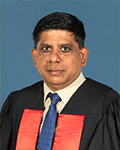EDITORIAL

Eng. Suran Fernando
Looking ahead: An engineering vision for tomorrow
No more power cuts, no fuel or gas queues, and everything seems to be settled now. Sri Lanka looks like it is back to normal, isn’t it? As engineers, we must recognize the danger in enjoying this relative normalcy that deceives us from realizing the actual ground reality in the country. The crisis we faced two years ago was primarily due to a severe foreign exchange imbalance that forced the nation even to restrict essential imports. Though a crisis in visible form is no longer seems to be disturbing us, has Sri Lanka managed to make the essential corrective actions to enter a safer economic territory than the deepest point we were at in 2022? The answer is a resounding NO. The comfortable state we enjoy now seems to be a false sense of security and normalcy. The only change is that international agencies have decided to release some more loans to Sri Lanka, which camouflages the real crisis that still exists in the ground. We have not yet been able to generate non-debt creating foreign income, which is a prerequisite to moving away from the economic crisis. This underscores the importance of the engineering fraternity's involvement as problem solvers in breaking this vicious cycle.
Sri Lanka's engineering community stands as a beacon of progress and resilience, crucial for navigating away from the current state. In this context, we need to closely examine the economic and social reforms proposed by the government. Will the proposed ‘Economic Transformation Act’ target the true reforms needed to elevate the nation from its current situation? Engineers should be able to assess how these reforms will help our motherland overcome the current scenario. Rather than eliminating existing technocracies by forming new powerful entities significantly politicized in terms of appointments and operations, little or no consideration is given to addressing basic deep-rooted issues. It is high time for engineers to study these reforms and propose a way forward before it becomes too late.
It is encouraging to note that IESL has taken progressive steps in analyzing some proposed reforms in recent areas of expertise. Proposed electricity sector reforms are one area where IESL adopted a study-based approach. One month ago, IESL held a press briefing to express its opinion on the proposed electricity sector reforms. IESL submitted a comprehensive report to the Reforms Committee and a concise report to the Ministry of Power and Energy, highlighting the issues in the draft bill after consulting its membership and experts.
Furthermore, IESL has been technically involved in issues related to the Nilwala salinity barrier, the mineral sector policy framework to boost exports, and some other areas of national importance. The subcommittee appointed to finalize recommendations on the proposed free trade agreements is currently in progress and a report is to be submitted to the government.
In any case, the involvement of engineers in nation-building is critically important at this juncture of the country. It is our solemn responsibility as citizens of this nation to fulfill our national duty today.
Eng. Suran Fernando
Editor, SLEN
suran.fernando@gmail.com
editor.slen@iesl.lk
